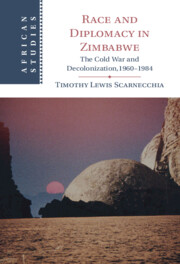Book contents
- Race and Diplomacy in Zimbabwe
- African Studies Series
- Race and Diplomacy in Zimbabwe
- Copyright page
- Contents
- Figures
- Acknowledgments
- Abbreviations
- Introduction
- 1 Historical Background
- 2 The Early 1970s
- 3 Liberation Struggles in Southern Africa
- 4 “We Don’t Give a Damn about Rhodesia”
- 5 Negotiating Independence
- 6 Negotiating Independently
- 7 The Big Gamble
- 8 The 1980 Elections and the First Years of Independence
- 9 Gukurahundi and Zimbabwe’s Place in the 1980s Cold War
- Conclusion
- Select Bibliography
- Index
- African Studies Series
2 - The Early 1970s
- Race and Diplomacy in Zimbabwe
- African Studies Series
- Race and Diplomacy in Zimbabwe
- Copyright page
- Contents
- Figures
- Acknowledgments
- Abbreviations
- Introduction
- 1 Historical Background
- 2 The Early 1970s
- 3 Liberation Struggles in Southern Africa
- 4 “We Don’t Give a Damn about Rhodesia”
- 5 Negotiating Independence
- 6 Negotiating Independently
- 7 The Big Gamble
- 8 The 1980 Elections and the First Years of Independence
- 9 Gukurahundi and Zimbabwe’s Place in the 1980s Cold War
- Conclusion
- Select Bibliography
- Index
- African Studies Series
Summary
This chapter continues to cover background context for the international diplomacy around Zimbabwe’s decolonization in the early 1970s. The emergence of Bishop Abel Muzorewa as a political leader is described. While Nkomo, Sithole, and Mugabe were still in detention, Muzorewa started a new political organization, the African National Council. Also discussed is the period of South African détente with the African nations of southern Africa, particularly Zambia. Failed Attempts to negotiate between Joshua Nkomo, Ndabaningi Sithole, and Ian Smith in 1974 are discussed, but the release of the nationalist leaders created new opportunities for political action. The attempt by the Frontline State presidentsto create unity between ZANU, ZAPU, FROLIZI, and the African National Council was solidified under the Lusaka Agreement of November 1974. Unity was elusive, however, as leadership battles were accentuated by the real fighting within ZANU’s forces, ZANLA, during the Nhari rebellion in late 1974. The divisions in ZANU were exacerbated by the assassination of ZANU leader in exile, Herbert Chitepo, in April 1975. The impact of these events are discussed, as is the growing concern by the Americans that the Soviets and Cubans would soon be in a position to better support the Zimbabwean liberation movements.
Keywords
- Type
- Chapter
- Information
- Race and Diplomacy in ZimbabweThe Cold War and Decolonization,1960–1984, pp. 38 - 63Publisher: Cambridge University PressPrint publication year: 2021



